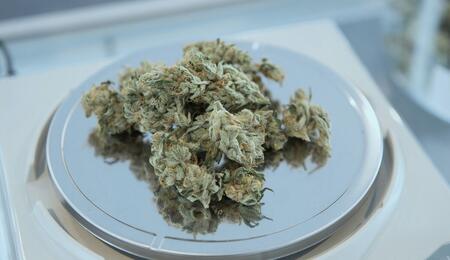Medical Cannabis and Opioid Dosages: Study

A recent study from the American Medical Association shows that continued use of medical marijuana can help reduce opioid prescriptions among patients suffering from chronic pain. New York patients who were given marijuana for longer than 30 days saw significant reductions in opioid amounts. The research results are consistent with long-standing anecdotal evidence that cannabis can work as an alternative to opioids when it comes to pain relief.
Researchers at New York's Department of Health looked at data from over 8,000 patients registered with the state's medical cannabis program to see how their opioid prescriptions changed over the period of eight months. They concluded that among pain patients who were given marijuana for more than a month, opioid amounts fell by almost 50 percent.
The study authors noted that this is the first kind of research effort encompassing a larger group of people and which "evaluated the association between the length of receiving [medical cannabis] and reduction in daily opioid doses." Most previous studies have relied on self-reported survey data or were limited to small groups of patients.
"Medical cannabis is increasingly being used as a treatment in pain management and this peer-reviewed study is further evidence that medical cannabis has the potential to reduce the amount of opioid-based medications needed to treat chronic pain," Acting Health Commissioner Dr. James McDonald said in a statement.
"I applaud the work done by members of the Department, as well as the Office of Cannabis Management and CUNY. These findings have the potential to further inform health providers and policymakers here in New York as well as in other jurisdictions where medical cannabis is not yet legalized or used to its fullest potential," McDonald said.
The study reveals that the daily opioid dosages of patients saw reductions of 47% to 51% of the baseline dosages after eight months. Patients who received cannabis for less than a month had their opioid dosages reduced by just 4 percent to 14 percent.
One of the study's authors Nicole Quackenbush, from the New York's Office of Cannabis Management, acknowledged all patients who have long reported that cannabis is effective medicine when it comes to pain management.
"Since the inception of the Medical Cannabis Program in New York State, we've heard anecdotal evidence from patients, caregivers and health care providers suggesting that medical cannabis can reduce the amount of opioids patients take to manage pain," she said. "Now we have the study demonstrating a statistically and clinically significant reduction for those patients who were on medical cannabis for a longer duration."
The research data was taken from New York's medical cannabis program and covers the period between 2017 and 2019. The researchers linked patient records with official state logs on prescribed opioids. Patients had to have a medical marijuana recommendation for treating chronic pain and at least one opioid prescription when they were first dispensed medical marijuana.
A total of 8,165 pain patients were featured in the study, with the researchers dividing them into two clusters. The first group included those who were given cannabis for more than 30 days after the recommendation for cannabis use had been made. The second group, those who registered with the program but discontinued cannabis purchases during the first month. Patients were further split into three groups based on their opioid prescription dosages before being recommended medical marijuana.
The main purpose of the research was to compare the number of opioid prescriptions between groups over the eight month period after the patients were first instructed to try medical cannabis. The records reveal that both groups eventually ended up with lower doses of opioids. However, what's more significant, the reduction was 5.6 times greater for patients who were exposed to continued cannabis use. Also, the patients who were being prescribed greater doses of opioids had greater reductions after trying medical marijuana.
Some of the study limitations that the authors highlight? The data used did not include information on race, ethnicity, or the underlying causes of chronic pain in patients. The study also lacked insights into cannabis dosages or products used, or why patients opted for medical marijuana, and whether this decision was intended to decrease opioid reliance. It's also unknown whether the patients used all of the cannabis and opioids provided or just some of it, and if they possibly supplemented some of those amounts with drugs from other sources.
The New York study is the latest in a series of studies exploring the relation between medical cannabis use and opioids. All incoming research appears to indicate or confirm that cannabis can help decrease reliance on opioids and that more and more people who use opioids are reaching out for cannabis as a substitute.
















